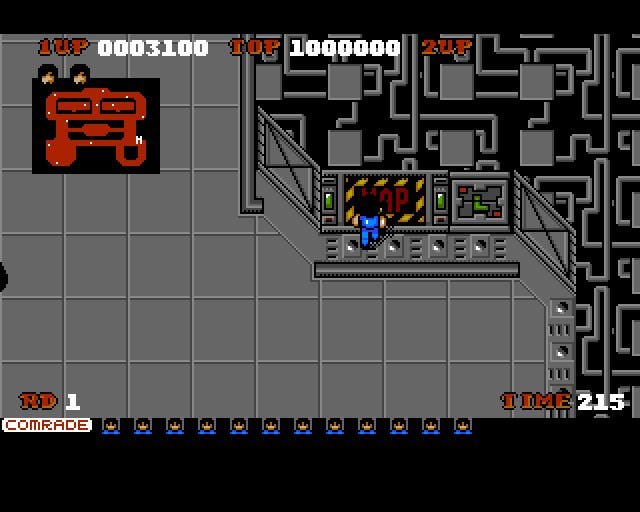The Edge of Reason?
The Tim Langdell story.
Paris, 2009
"It's painful, living with this constant threat. You go home for the weekend and it's all you can talk about with your friends, yet not one of them can help you. You feel alone and there seems to be no way out. It is hard to sleep and to concentrate. We do our best to stay positive but it's difficult. We're finding it hard to start work on our next game."
Eight months ago David Papazian was on top of the world. His company, Mobigame, had just released its first videogame for the iPhone. In the space of just a few weeks it had won two prestigious awards. The past two years of early mornings, late nights and tireless endeavour were set to pay off; the sacrifices had been worth it, the indie developer dream was coming true.
Today, he sits dejected and worn. Banned in the UK, USA and Germany, his game may be critically acclaimed but, for most, it is also impossible to buy. On 15th July, 2009, just one week after Apple nominated Mobigame's debut title as one of their 'Top 30 Favourite iPhone Games', it was removed from the App Store. Not because it's unfinished, or because it might damage your hardware, nor any of the usual reasons that software is removed from sale. Rather, it's banned because of its name: Edge.
London, 1979
This story begins in Covent Garden, London at the end of the 1970s. It was here that a young entrepreneur, Timothy Langdell, founded the game publishing company Softek: Masters of the Game. Softek hired young game makers, offered to bankroll their developments, publish their games, and then split the proceeds. The set-up worked well and, while Softek's releases could hardly be called blockbusters, they were successful enough to fuel the enterprise.

But Langdell was unhappy. The company name, chosen to reflect the young, fresh vibrancy of an emergent industry, seemed a little embarrassing five years down the line. So in 1984 Langdell changed its name to The Edge, simultaneously registering the trademark in both the US and the UK. In this moment the seeds of a thousand lawsuits were sown: nobody but nobody could use the words 'The Edge' in relation to a videogame-related product without first agreeing it with Langdell. Of that, he would make certain.
By 1990 Langdell was yet to file any lawsuits, but he was no stranger to the courts. That year Michael and Ian Jones, two programmers who worked for The Edge porting the arcade game Soldier of Light to Commodore 64, won a court battle against the publisher for withholding payments. But before they saw any money, Langdell and The Edge had relocated from London to Los Angeles. Langdell claims that the move had nothing to do with avoiding paying his developers. Rather, it was due to a combination of "the weather, an addiction to Pukka Pies and Mushy Peas and a deal involving several hundreds of thousands of pounds paid by Commodore International for The Edge to become a leading Amiga developer assisting with the launch of the CDTV". No one from Commodore was able to verify his claim. Nevertheless, one way or another, The Edge moved stateside.
Los Angeles, 1990
The move to the sunnier climes of Los Angeles brought with it more than an alleged windfall from Commodore. From 1990, perhaps realising what a valuable and wide-ranging trademark it had at its disposal, The Edge's primary business shifted from publishing videogames to vigorously pursuing companies whose products it believed infringed 'The Edge' mark.
From Namco's PlayStation release Soul Edge (which had its name changed to Soul Blade for the West) to Sony's PlayStation Edge to the UK's own Edge magazine, Langdell confronted anyone who used his trademark in relation to videogames. In every case the message was clear: change the name of your product, pay us a licence fee or face a court hearing. Some paid the fee quietly. Others, faced with legal threats that they believed were dubious, turned the tables and instead took The Edge to court. No matter what the outcome of these cases, Langdell's energy in protecting his trademark never faltered, even if the trickle of games that bore the name had long since dried up.
France, 2007

In 2007 David Papazian founded Mobigame with his associate, Matthieu Malot. For two years the pair worked on their debut iPhone title under the working title Cube, changing the name to Edge when they read previews of another developer's game of the same name. Edge was released in December 2008 to critical acclaim, winning the prestigious Milthon award for Best Mobile Game in Paris and the IMGA (International Mobile Game Award) at the mobile world congress in Barcelona. These accomplishments provided a ringing endorsement of Apple's emerging platform, proving that two men could turn a good idea into a global success without the backing of a major publisher.
But not everyone shared in the celebration. On 7th April, 2009, five months after its release, Papazian received an email from Apple. It stated: "We have received notice from Edge Games, Inc. ('Edge') that Edge believes your application named Edge infringes Edge's rights. Accordingly, please take steps to review your application to ensure that it does not violate the rights of another party."
Langdell had found Mobigame.

